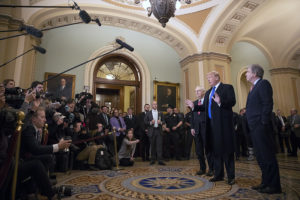
President Donald J. Trump, joined by Senate Majority Leader Mitch McConnell and Senator Roy Blunt, R-MO., speaks with reporters prior to attending a Senate Republican lunch Tuesday, March 26, 2019, at the U.S. Capitol in Washington, D.C. (Official White House Photo by Joyce N. Boghosian)
In a significant change to a story the Washington Post published in January, the paper now carries the following notice at the top:
Correction: Two months after publication of this story, the Georgia secretary of state released an audio recording of President Donald Trump’s December phone call with the state’s top elections investigator. The recording revealed that The Post misquoted Trump’s comments on the call, based on information provided by a source. Trump did not tell the investigator to “find the fraud” or say she would be “a national hero” if she did so.
Instead, Trump urged the investigator to scrutinize ballots in Fulton County, Ga., asserting she would find “dishonesty” there. He also told her that she had “the most important job in the country right now.” …The headline and text of this story have been corrected to remove quotes misattributed to Trump.
In January, the WSJ’s James Freeman reminds readers, the Post’s original story and inaccurate quotations were widely circulated in major media. Mark Hemingway noted at The Federalist how the Post’s story did not escape the notice of Mr. Trump’s political adversaries.
Mark Hemingway writes at The Federalist:
House Democrats would cite the article and its fabricated quotes on page 10 of their impeachment brief, as well as highlight the article and its fake quotes in oral arguments during the televised impeachment trial.
The Post’s media critic Erik Wemple notes that the Post’s account of the call was based on one source:
“an individual familiar with the call who spoke on the condition of anonymity because of the sensitivity of the conversation.”
Though that source wasn’t identified in the Jan. 9 story, The Post did identify her in its follow-up based on the Wall Street Journal scoop: “The Washington Post reported on the substance of Trump’s Dec. 23 call in January, describing him saying that Watson should ‘find the fraud’ and that she would be a ‘national hero,’ based on an account from Jordan Fuchs, the deputy secretary of state, whom Watson briefed on his comments.”
In an interview with the Erik Wemple Blog, Fuchs said, “I believe the story accurately reflected the investigator’s interpretation of the call. The only mistake here was in the direct quotes, and they should have been more of a summary.”
According to Fuchs, The Post disclosed her role in the story with her permission, and that she’d gotten the debriefing from the investigator — a direct report of hers — “shortly” after the call from Trump concluded.
To review, continues Mr. Freeman, “the Post ran with bogus quotations attributed to President Donald Trump supplied by one anonymous source who was not even on the call”.
Two months later when a Journal report revealed the quotations to be false, writes Mr. Freeman, “the Post only revealed the identity of the anonymous bearer of false information after she granted her permission.”
What’s particularly chilling is Mr. Wemple’s contention that the fabricated quotations were “unnecessary” in the telling of a damning story about Mr. Trump.
If you’re willing to fight for Main Street America, click here to sign up for the Richardcyoung.com free weekly email.





